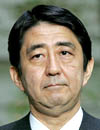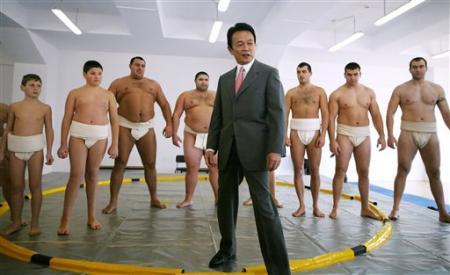Though it seems like everyone and his brother (including myself) are writing off Abe as a dishonest hack who might be replaced after the July upper house elections, not everyone sees it that way. I thought I’d take a quick look at some of my favorite opinionated pundits to see who’s up and down with Abe’s performance, particularly in the realm of the reform agenda (something we don’t hear too much about these days:
Up — Robert Feldman of Morgan Stanley:
Brilliant, Mr. Abe, Brilliant!
February 01, 2007By Robert Alan Feldman | Tokyo
Political commentary on PM Abe has been unrelentingly negative. Indeed, there seems to be a bandwagon effect, as more and more pundits jump in to criticize. Unseen by these pundits, however, is a revolutionary change in the process of government. Policy competition within the government is emerging and seems to be a permanent feature of governance. Prior to PM Koizumi’s tenure, policy areas were typically monopolies. One ministry had control of the agenda for a given area. By gentlemen’s’ agreement, other ministries did not move beyond their jurisdictions.
…
Under PM Abe, competition between the PM’s Office and the bureaucracies has become the standard. Now, from the very start, PM Abe has formed special committees of non-government experts to deal with a broad range of issues. Examples areas include labor policy, agricultural policy, education policy, innovation policy, and — most interestingly — financial sector reform policy.[1] Action in the latter area has accelerated sharply over the last few days, and points to what we can expect in other areas.
…
[Feldman then describes the series of events that have led to the formation of competing committees — one in the Council on Economic and Fiscal Policy (a cabinet advisory body intended to take initiative of the budgeting and policymaking agenda away from the bureaucrats), and one in the Financial Services Agency (who currently has jurisdiction in this area)]
…
Now that both committees exist, they will have to compete in the public eye. Both will release materials and minutes, so that investors and the public can follow the debate closely. Moreover, since PM Abe’s committee has been formed under the CEFP, the matter will have to be discussed in that committee, under his own chairmanship. Naturally, both committees take the debate seriously.The next phase of the debate is gathering opinions from the public. Both committees are eagerly seeking advice from around the world. Indeed, a friendly competition has emerged to see which committee can come up with the best plan. Expert witnesses will be called by both committees, and the press will notice.
…
Even more important could be the effect on confidence [in the market that sparked by the “intelligent policies” that Feldman is sure will result from this policy competition] in the Abe government itself. The government has already scored major wins in foreign policy, but a clear victory on reform has yet to emerge. The financial system debate is a major opportunity. The conclusion will not be far off. The PM’s own subcommittee on the issue is reportedly scheduled to submit its ideas by the end of March. The FSA committee cannot lag far behind, for fear of losing the battle.
Comment: This is very encouraging as this policymaking style is a similar of Koizumi’s smart management of reform campaigns: Take a sector that is in dire need of reform (in this case Japan’s financial markets), take up bold reform measures at the cabinet level, and then spark competition among agencies to try and work out the best policy. This is similar to Koizumi’s tactics that resulted in privatization of the highway public corporations and Japan Post — two interrelated sources of waste in the economy and a drag on public resources. Of course, “international competitiveness” for the financial sector is a relatively small issue compared to the quixotic goals of the Koizumi years.
Continue reading Up and Down on the Abe reform agenda




 There are those who have argued for interest rate increases by claiming that a rate hike would provide a better return on savings accounts. This, of course, is disingenuous. Current returns are next to nil; even doubling the prime rate from 0.25% to 0.50% would mean little in the way of returns on savings accounts. It would, however, mean substantial increases in terms of mortgages, business loans and automobile loans.
There are those who have argued for interest rate increases by claiming that a rate hike would provide a better return on savings accounts. This, of course, is disingenuous. Current returns are next to nil; even doubling the prime rate from 0.25% to 0.50% would mean little in the way of returns on savings accounts. It would, however, mean substantial increases in terms of mortgages, business loans and automobile loans.